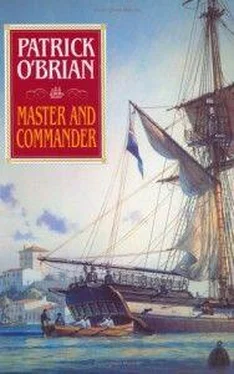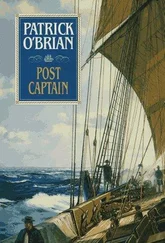In fact, the starboard watch achieved five minutes and fifty-seven seconds; but on the other hand they did not hit their cask, and in the anonymous dusk there was a good deal of audible criticism of 'unscrupulous grass-combing buggers that blazed away, blind and reckless – anything to win. And powder at eighteen pence the pound.'
The day had given place to night, and Jack observed with profound satisfaction that it made remarkably little difference on deck. The sloop came up into the wind, filled on the other tack and bore away towards the wavering flare on the third tub. The broadsides rapped out one after another, crimson-scarlet tongues stabbing into the smoke; the powder-boys flitted along the deck, down through the dreadnought screens past the sentry to the magazine and back with cartridge; the gun-crews heaved and grunted; the matches glowed: the rhythm hardly changed. 'Six minutes and forty-two seconds,' he announced after the last, peering closely at his watch by the lantern. 'The larboard watch bears the bell away. A not discreditable exercise, Mr Dillon?'
'Far better than I had expected, sir, I confess.'
'Well now, my dear sir,' said Jack to Stephen, 'what do you say to a little music, if your ears are not quite numbed? Is it any good inviting you, Dillon? Mr Marshall has the deck at present, I believe.'
'Thank you, sir, thank you very much. But you know what a sad waste music is on me – pearls before swine.'
'I am really pleased with tonight's exercise,' said Jack, tuning his fiddle. 'Now I feel I can run inshore with a clearer Conscience – without risking the poor sloop too much.'
'I am happy you are pleased; and certainly the mariners seemed to ply their pieces with a wonderful dexterity; but you must allow me to insist that that note is not A.'
'Ain't it?' cried Jack anxiously. 'Is this better?'
Stephen nodded, tapped his foot three times, and they dashed away into Mr Brown's Minorcan divertimento.
'Did you notice my bowing in the pump-pump-pump piece?' asked Jack.
'I did indeed. Very sprightly, very agile. I noticed you neither struck the hanging shelf nor yet the lamp. I only grazed the locker once myself.'
'I believe the great thing is not to think of it. Those fellows, rattling their guns in and out, did not think of it. Clapping on to the tackles, sponging, swabbing, ramming – it has grown quite mechanical. I am very pleased with them, particularly three and five of the port broadside. They were the merest parcel of lubbers to begin with, I do assure you.'
'You are wonderfully earnest to make them proficient.'
'Why, yes: there is not a moment to be lost.'
'Well. You do not find this sense of constant hurry oppressive – jading?'
'Lord, no. It is as much part of our life as salt pork -even more so in tide-flow waters. Anything can happen, in five minutes' time, at sea – ha, ha, you should hear Lord Nelson! In this case of gunnery, a single broadside can bring down a mast and so win a fight; and there's no telling, from one hour to the next, when we may have to fire it. There is no telling, at sea.'
How profoundly true. An all-seeing eye, an eye that could pierce the darkness, would have beheld the track of the Spanish frigate Cacafuego running down to Carthagena, a track that certainly would have cut the Sophie's if the sloop had not lingered a quarter of an hour to dowse her lighted casks; but as it was the Cacafuego passed silently a mile and a half to the westward of the Sophie, and neither caught sight of the other. The same eye would have seen a good many other vessels in the neighbourhood of Cape Nao for, as Jack knew very well, everything coming up from Almena, Alicante or Malaga had to round that headland: it would particularly have noticed a small convoy bound for Valencia under the protection of a letter of marque; and it would have seen that the Sophie's course (if persisted in) would bring her inshore and to the windward of the convoy in the half hour before first light.
'Sir, sir,' piped Babbington into Jack's ear.
'Hush, sweetheart,' murmured his captain, whose dreaming mind was occupied with quite another sex.
'Mr Dillon says, top lights in the offing, sir.'
'Ha,' said Jack, instantly awake, and ran up on to the grey deck in his nightshirt.
'Good morning, sir,' said James, saluting and offering his night-glass.
'Good morning, Mr Dillon,' said Jack, touching his nightcap in reply and taking the telescope. 'Where away?'
'Right on the beam, sir.'
'By God, you have good eyes,' said Jack, lowering the glass, wiping it and peering again into the shifting sea-haze. 'Two. Three. I think a fourth.'
The Sophie was lying there, hove to, with her foretopsail to the mast and her maintopsail almost full, the one counterbalancing the other as she lay right under the dark cliff. The wind – what wind there was – was a puffy, unreliable air from the north-north-west, smelling of the warm hillside; but presently, as the land grew warmer, it would no doubt veer to the north-east or even frankly into the east itself. Jack gripped the shrouds. 'Let us consider the positions from the top,' he said. 'God damn and blast these skirts.'
The light increased; the thinning haze unveiled five vessels in a straggling line, or rather heap; they were all hull-up, and the nearest was no more than a quarter of a mile away.
From north to south they ran, first the Gloire, a very fast ship-rigged Toulon privateer with twelve eight-pounders, chartered by a wealthy Barcelona merchant named Jaume Mateu to protect his two settees, the Pardal and the Xaloc, of six guns apiece, the second carrying a valuable (and illegal) cargo of uncustomed quicksilver into the bargain; the Pardal lay under the privateer's quarter to leeward; then, almost abreast of the Pardal but to windward and only four or five hundred yards from the Sophie, the Santa Lucia, a Neopolitan snow, a prize belonging to the Gloire, filled with disconsolate French royalists taken on their passage to Gibraltar; then came the second settee, the Xaloc; and lastly a tartan that had joined the company off Alicante, glad of the protection from Barbary rovers, Minorcan letters of marque and British cruisers. They were all smallish vessels; they all expected danger from the seaward (which was why they kept inshore – an uncomfortable, perilous way of getting along, compared with the long course of the open sea, but one that allowed them to run for the shelter of coastal batteries); and if any of them noticed the Sophie in the stronger light they said, 'Why, a little brig, creeping along close to the land: for Deсia, no doubt.'
'What do you make of the ship?' asked Jack.
'I cannot count her ports in this light. She seems a little small for one of their eighteen-gun corvettes. But at all events she is of some force; and she is the watch-dog.'
'Yes.' That was certain. She lay there to the windward of the convoy as the wind veered and as they rounded the cape. Jack's mind was beginning to move fast. The flowing series of possibilities ran smoothly before his judgment: he was both the commander of that ship and of this sloop under his feet.
'May I make a suggestion, sir?'
'Yes,' said Jack in a flat voice. 'So long as we do not hold a council of war – they never decide anything.' He had asked Dillon up here as an attention due to him for having detected the convoy; he really did not want to consult him, or any other man, and he hoped Dillon would not break in on his racing ideas with any remarks whatever, however wise. Only one person could deal with this: the Sophie's master and commander.
'Perhaps I should beat to quarters, sir?' said James stiffly, for the hint had been eminently clear.
'You see that slovenly little snow between us and the ship?' said Jack, breaking across him. 'If we gently square our foreyard we shall be within a hundred yards of her in ten minutes, and she will mask us from the ship. D'ye see what I mean?'
Читать дальше
Конец ознакомительного отрывка
Купить книгу












